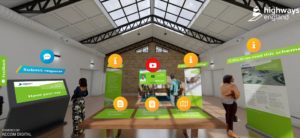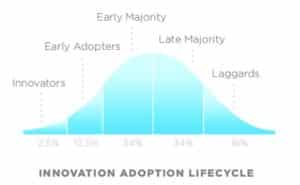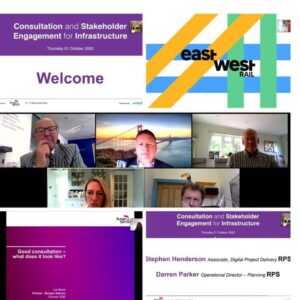News & Insights
Infrastructure consultations going digital? Tales from this year’s Waterfront Conference
By my reckoning, last Thursday’s Waterfront conference on Consultation and Stakeholder engagement for Infrastructure was my fifth consecutive appearance as Guest Chair of this event.
It is normally held in central London in the offices of its prime sponsor, the law firm Burgess Salmon, but this time around it was a virtual conference – with the attendant advantages – and disadvantages. Making my own coffee was the least of our concerns but networking and audience reactions both suffer in comparison with the traditional forms of engagement.
And this, naturally, became the theme of the day. Those attending are usually busy with the complex requirements of the NSIP process. Many work on multi-million – or even billion-pound projects over lengthy timescales. Whereas Institute members in other sectors find that the pandemic has so far affected the entire envisaged timeline, those working infrastructure may see COVID-19 as maybe affecting one or maybe two years out of the five-year duration of the project.

Many of the presentations therefore illustrated the way in which digital engagement technology can bring consultations to a socially-distanced audience. Consultants, Stantec (who bought out Peter Brett Associates), Hadley and AECOM proudly showed us their latest whizzy offerings, and from Commonplace, we heard the Company that seems to have persuaded the Ministry of Housing, Communities & Local Government of the benefits of this approach in their recent White Paper on changes to the English planning system.

Highways England also demonstrated the use of sandbox game-technology to develop consultation tools for children and adolescents, based on Minecraft. These are powerful tools to stimulate interest, especially among the younger generations, and for consultation teams struggling for mind-space in the wider population, such innovations have much to offer.
Then, as is customary, we had an Open Forum. I’m not the best suited to play the Fiona Bruce role, but we had a great range of questions. Someone asked what technologies do not seem to work? Another asked about the next new gizmos. There was another asking about the direction of travel. But, guess what? An emerging consensus arose – that, wonderful and fun as these applications are, the challenge was not in making them go better, faster or cheaper – but in integrating these methodologies with the old stuff that we miss so much in the socially-distanced world. Hannah Staunton of East-West Rail put it succinctly when she said, “We will have to go back to face-to-face.” Ruth Shepherd, in a wide-ranging discussion of latest consultation trends (presentation available from the Institute) put it equally well by claiming that if there is no face-to-face element, people seriously doubt if there has been a genuine consultation!
Listening to all thirteen speakers, and reflecting on the equivalent Conferences over the past five years, my interpretation is that 2020 will, indeed turn out to be a turning point in the acceptability and practicality of much of the digital engagement toolbox. It is true that some of this was on display in 2015, but it was there to be admired but not necessarily used and exploited.
Back in the 1950s, American academics developed something they called the diffusion of innovation process. Over the years it evolved to become the 
What the Waterfront Conference may have shown yesterday is that COVID-19 may have been the stimulus that makes digital engagement a mainstream dialogue method. The Institute believes this may well be the case and our attention will increasingly turn to ensuring that those who deploy such tools are given the conceptual background and a standards-based approach that will ensure best practice in public and stakeholder consultation.
Rhion H Jones LL.B
Founder Director
The Consultation Institute
2 October 2020




